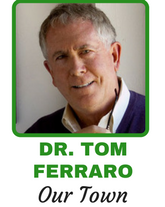In 1961 a chance meeting between two physicians led to a major discovery about the causes of heart disease and how to prevent it.
Unfortunately for us all these findings were essentially ignored and man’s ability to implement the cure has been impossible to achieve. This is their story.
In 1961 Dr. Stewart Wolf, a professor of medicine at Temple University, was having a casual chat with Dr. Benjamin Falcone, a local physician in Roseto, Penn.
Dr. Falcone mentioned that the folks of Roseto have a strikingly lower rate of heart disease than people of the surrounding communities.
This comment struck Dr. Wolf and his associate Dr. John Bruhn as interesting enough to begin epidemiological research on this town. The results and conclusions of their study were eventually published in the now classic medical text “The Power of the Clan: the influence of human relationships on heart disease.” (1993)
The history of the little town of Roseto is of interest. In 1882 the families from a town called Roseto Val Fortore in southern Italy immigrated to a place in the mountains of Pennsylvania and called their new home Roseto.
Based upon its topography this community remained isolated and insulated from the surrounding more modernized American communities. They maintained a village that upheld the Italian spirit upholding family, not the individual and where “cooperation outpaced that of competition and where greeting, enjoying and helping neighbors was the order of the day. “
This value system apparently gave this community a remarkable immunity from fatal heart attacks.
These findings were not new but were unusually vivid. In 1938 Dr. C.P. Donnison also discovered an absence of hypertension, diabetes or peptic ulcers in the remote areas of Africa.
In his book “Civilization and Disease” he concluded that when the speed of change outruns our ability to adapt to it this impacts both our minds and bodies in serious ways. He named hypertension, diabetes and peptic ulcers ‘the diseases of civilization.’
We clearly live in a world which is hypercompetitive and where narcissism and self-interest are the manifest conditions of the day. An apt image of modern man today is the increasingly popular walking dead films. The zombie is a perfect symbol of modern man’s current state of dis-ease, exhaustion, aloneness, greed and tireless hunger.
Emile Durkheim was a French sociologist working at the beginning of the 20th century who was also concerned about the slow disintegration of our sense of connection to community and coined the term existential anomie which is still with us today.
In 1904 Henry Adams wrote “A Law of Acceleration” where he warned us that we would face many problems based upon the rapid speed of change that technology was about to bring. And shortly thereafter Yeats wrote The Second Coming which again signaled the dawning of a new age of speed where “turning and turning in the widening gyre, the falcon cannot hear the falconer.”
All this is more than enough proof that a lack of an adequate and safe holding environment for humans means that they will feel anxiety and that often this anxiety will be internalized and turn into heart disease of some other form of the so called ‘diseases of civilization ‘.
But I also know that the human mind is endlessly adaptive and seeks out and finds solutions to its biggest problems. That is why dooms day prophecies are always wrong. It may take the human culture time to adapt but adapt it will.
I can readily see already how we are finding answers to our loneliness, our anomie and sense of disconnection. Here are just a few examples
1. The emergence of ‘pocket communities’: These are small communities popping up in suburbia which are like cul de sacs but with the addition that they all share a central lawn, all houses face toward with central lawn, have front porches, and the kids are known and looked out for by all.
2. Yoga communities: These spiritual meditation environments are now in nearly every community and are based upon a community feel with rules that are firm yet loving.
3. Country club life: Though often thought of as elitist the great appeal of these clubs is that it is a closed community where everyone knows everyone else over long periods of time and bonds and traditions are upheld for the betterment of the group.
4. Sports in general: Whether it’s football, soccer or tennis every sport involves upholds rules and moral codes of conduct, a community of players which bond together and a pace of life that is slower than the frantic nature of modern life.
These are just a few of the ways that humans are creating in order to adapt to the frantic fast paced anxiety producing, illness producing nature of post-modern life.
I recommend that you try one on for size.



